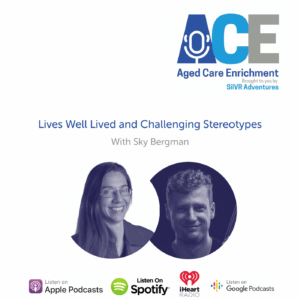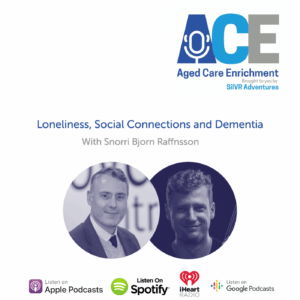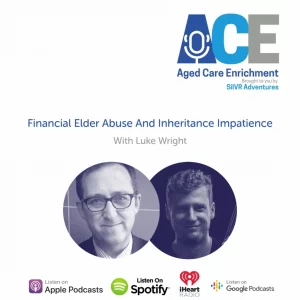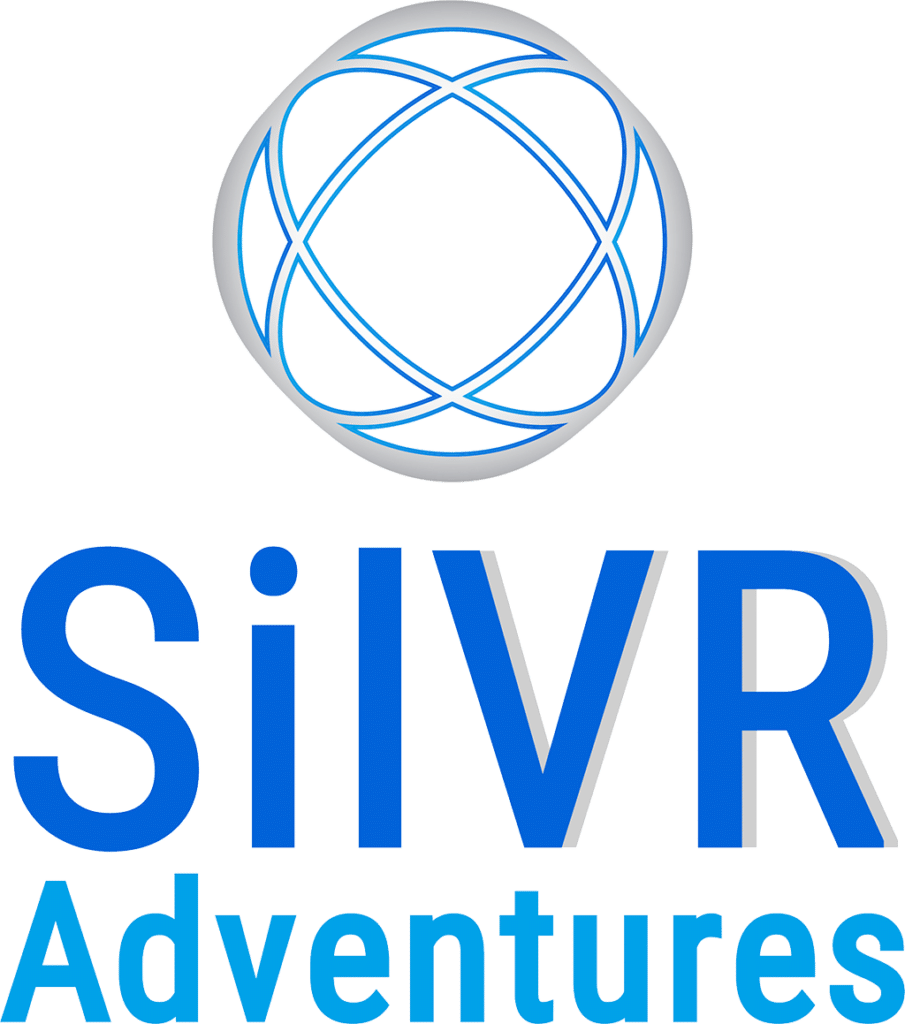Melissa Reader is the CEO of the Violet Initiative, a not-for profit organisation focused on reducing regretful outcomes at the end of life. Melissa explains that 50% of people end their lives in hospital, which is the least preferred place to die. And that with better planning, more honest conversations and more education this doesn’t need to be the case.
The Violet Initiative states that regretful deaths cost the community over $1 billion a year, a cost that is fundamentally avoidable. Not only does it affect individuals and organisations, it also dramatically affects the aged care workforce, and Melissa shares some resources for supporting workers with these difficulties.
This conversation with Melissa is one half of a double episode special on end of life enrichment, also featuring Darren Evans from After Cloud.
Transcript
Ash de Neef: Great. Hi Melissa. Thanks for joining us on the podcast today.
Melissa Reader: Thanks for having me.
Ash de Neef: My pleasure. And you’re here representing the Violet Initiative. Can you tell us about the Violet Initiative?
Melissa Reader: Yes. Look, the Violet Initiative is really the new name for an organisation that’s been around in Australia for almost 30 years, working at a very local level supporting families and caregivers as they cared for people in the last stages of life.
It was very community led for a long time. And what we did was train volunteer, mentors, and we help them to go into people’s homes and support those families and caregivers. And what they did was help with all of the nonclinical aspects of that last stage and end of life. So it was helping families with understanding and acceptance, preparation and communication.
And actually what that group of volunteers did in a number of communities had a huge impact, but what we could see from the board’s perspective when we started to look at this in about 2016, was there wasn’t enough scalability or sustainability in that model for an issue this big.
So we spent some time together, had some good and courageous conversations and we decided to really wind the operation down and figure out what was the good work that was being done by those volunteers in those homes, with those families and caregivers. And, take that wisdom and practice and start to build a set of programs and tools and resources, and then start to scale that out through partnerships and through technology.
So it’s been a lot of work over the recent years, but we really have got a business model now and a set of partnerships and programs and resources that we think are purpose fit, for the size of the problem that we’re trying to help with.
Ash de Neef: And so what was it that brought you into this sphere? This end of life sphere?
Melissa Reader: Look it was really a direct result of my own personal experience. So I have run consultancies through most of my professional career in a range of different settings. But I found myself in a really tough situation in 2011 where I was caring for my first husband Mauro. Where he was diagnosed very quickly and, with enormous shock and surprise for our family with a really aggressive cancer disease.
We were pretty regular, normal, busy, happy families, we had three young kids. One was only six months old and his diagnosis just came at a huge shock. And I think one of the things that I found most difficult through the year and a half of his illness was the fact that we just couldn’t talk openly and honestly about what was happening for him and what, was happening with our family. Just couldn’t have any of those honest conversations. Not with our families, not with his medical staff. And certainly not between ourselves as husband and wife. It was incredibly tough.
And I guess as I look back on the last stage of his life, the last month of his life, he endured many surgeries, treatments and spend a lot of time in hospital. And I think we may have made decisions differently, if some part of the system had been able to really slow us down and help us make sense of what was happening and help us prepare for what lay ahead. What was really an inevitability. So he died in intensive care.
We were very unprepared for it. He didn’t have a will in place. All sorts of things happened that really shouldn’t have. And it left me with a lot of regret about the way that really could have played out quite differently. So it was really fortuitous that I was able to find this organisation and understand exactly the, need that they were designing for. How you help people really understand the human and social aspects of the last stage of life and help people make better decisions. So they, they really hopefully get better outcomes.
Ash de Neef: Yeah, that’s a powerful story and a really important mission there, and what was it that you set out to do with the Violet Initiative?
Melissa Reader: What we’ve been really focused on Ash is building a community support initiative that is driven by this problem that so many Australians just do not have the experience of the end of their lives that they would want to have. Or that frankly, they deserve to have.
There’s often a really big gap between what we would hope for and what happens, and in that gap lies a lot of regret. A lot of regretful outcomes where things don’t go to plan or, in fact, there often isn’t a plan. And the work that Violet’s been doing has been looking pretty closely at the cost of regretful outcomes, cause they do cost us dearly as people within our families and within our communities.
But they also cost us significantly economically in all parts of the health care system, across a range of different businesses. It’s a billion dollar problem that we’re facing in this country, we’re managing that size of a problem right now, and that’s going to significantly increase as our population ages.
There’s so much that’s changing in this area. Caregiver profiles, disease profiles, and the number of people dying each year will double in the next 20 years. So that number, a billion dollars is a significant one and it’s going to get significantly larger.
So Violet’s work is to reduce regretful outcomes and to reduce the costs associated with regretful outcomes, both human and economic. And we’re making a positive contribution to the last stage of life in order to do that.
Ash de Neef: So talking about the economic results of regret, this strikes me as something that people don’t often associate with the end of life, that there is an economic toll here or a cost.
Why do you think this is escaped attention for so long?
Melissa Reader: I think partly the taboo nature of the topic contributes to that. And there’s a lot of behavioral complexity around the last stage of life and the end of life. It’s much easier for us to stay in the mindset of hope and positivity.
So they are things that we tend to push to the side or push under the carpet, but a large part of that cost actually sits in poor preparation and poor planning for families and for individuals as people enter the last stage of their life.
And it results in a lot of unnecessary, unwanted and unplanned time spent in hospital. The research tells us that, that is not where we want to be, but we know that, one in two people will die in hospital today. It’s our least preferred place to die. And we’re looking really closely at what the drivers of those regretful outcomes are from planning and preparation.
I think it’s around 14% of Australians actually have sufficient plans in place for the end of their lives, that’s a big part of the issue,. But also understanding acceptance, family dynamics very often people are just not on the same page when they’re experiencing this with a family member.
There are very different views perhaps , on what ought to be the approach to mum’s care. For example, mum might be 95 and actually very, very frail and actually coming to the natural end of her life. But the response might be, let’s do everything for mum. So she finds herself in an ICU setting not at all where she wants to be.
So we’ve got really a big gap in the system around how we help people, slow things down and gently and gracefully understand the last stage of someone’s life. And actually understand the attitudes and preferences of the person that they’re caring for and being able to advocate on their behalf to help them have the kind of experience that they would actually wish to have.
Ash de Neef: Yeah, fantastic. And I can see that a big part of that would be an education. In saying that lives do end. Everyone’s life comes to an end and acknowledging that there is a time to accept that.
Melissa Reader: Yeah. Look, education is absolutely part of it, but there are three really clear gaps that we can see in the way that this is currently being experienced.
This is a life-stage, and we’re very good as people in families and communities around designing, organising ourselves for other life stages, we know how to get the information that we need. We know how to rally people around us to help us through that. And I think birth is a very obvious example in parallel. But this is the last stage and as a society, we’re just not very good at all at acknowledging it at planning for it or talking about it. We don’t do that sufficiently well.
So Violet is really anchoring all of its work in the last stage of life. And what we’re trying to do is build an organisation that over the next couple of years will become like a Beyond Blue or a national support initiative that is a go-to for people as they care for loved ones through that last stage.
Secondly, we can see a really important gap around nonclinical support the human, the social, the emotional aspects of end-of-life care. There’s some wonderful work being done in the clinical spaces, but we can see a gap that sits alongside it, that’s actually a very natural and synergistic extension to good clinical care. We often talk about it as a parallel model of care, and that’s where our work sits.
And thirdly we’ve always had a strong focus on the people who are caring for people at the end of life in both informal and formal roles. So that’s obviously the caregivers and the families, but it’s also really the workforces that do this caring work in health care, in aged care and in a range of different settings.
They have enormous impact and influence and agency actually over how that experience plays out. And they make many of the critical decisions that happen as part of that life stage, particularly as that person’s health declines. But they’re really under-served in the experiences we see today.
And quite commonly these decisions come up at two or 3:00 AM in the morning. And if people are not prepared for what lies ahead and for those really important decisions, things are rushed, poor decisions are made, and the care trajectory and the experience can start to take some very different paths.
Ash de Neef: And are you taking the last stage of life to be when there’s a prognosis reached or where are you defining that at?
Melissa Reader: We’ve done a lot of work around defining the last stage of life with our really wonderful and very committed clinical committee. And where we’ve landed is it’s the life stage where someone is now sick enough or frail enough that they might die. And there are a range of different clinical tools and other methods that can be used to determine that. And often they are, but often that’s not communicated to families or caregivers.
So a large part of our work, particularly in aged care settings is helping staff to use those tools more effectively and helping them to build their skills, to have more capable and willing conversations with families and caregivers as their resident, as their loved one enters that last stage of life.
Because if they can be more aware and accepting and be much better supported and prepared as they go through that they can make decisions actually quite differently. They can make the most of the time they have together. And they can really be able to take the time to understand the preferences and the attitudes of the person that they’re caring for so that they can help them have the experience that, they’d wish to have.
Ash de Neef: So Melissa, a lot of our listeners in the aged care space, whether working for a provider or perhaps caring for someone themselves, what do these issues of regretful death look like within that industry?
Melissa Reader: Ash to be really Frank. So many of the predictable deaths that happen in this country each year happen in an aged care setting.
So there’s around a hundred thousand predictable deaths and 60,000 of those are happening in aged care settings. So from our perspective, and I’m sure so many would agree and support my reply here that this industry is really key to the structural and the cultural change that’s needed.
And as people are entering aged care, we know that they’re now they’re entering later. They have higher levels of acuity. They have multiple co-morbidities. So, the data tells us that actually a third of residents will die in the first 12 months, of being in aged care setting. So they’re entering in the last stage of their lives. But families and friends are often really unprepared and unsupported and actually unaware of that.
So that’s where our early intervention approach is really looking at helping in terms of preparation, but the wider effects of this problem play out really significantly for the workforce. These are people that are dealing with death and dying every day in their work, and that takes a really heavy toll.
And I think we’ve seen in so much of our industry consultation, so many people do this so well today, both businesses and individual staff, and individual champions, but it’s not codified it’s not done consistently well. And it really ought to be considering how many of those predictable deaths that are happening in this context.
Staff, particularly those staff in kind of more senior roles, maybe senior RNs or those that are having conversations with families are managing really difficult dynamics. And they’re often managing, up to five family relationships per resident. That’s a pretty big job to navigate in addition to everything else they’re doing. And what we’re seeing is some really measurable impacts on productivity and on resilience and engagement and often burnout .
There was a piece of research that came out of QUT that showed 95% of aged care staff have experienced moral distress around end of life issues. Over 75% haven’t been trained sufficiently in this work. So it’s a pretty big and pressing issue. And there’s a lot of costs that sits within aged care that can be attributed to this.
It’s obviously come up in the Royal commission a number of instances, a number of occasions and some very difficult stories. And it’s also been prioritised as part of the recommendations to really increase workforce training in end of life care.
So again, Violet is really developing products and programs to assist with this and be able to scale the impact of that work nationally.
Ash de Neef: Great. And these programs and offerings, what is the Violet Initiative got at the moment that people can access?
Melissa Reader: We’ve got really two key products that, we’ve been testing and co-designing with providers over the last couple of years. And we’re now starting to scale out more broadly.
The first is through the Violet Academy, which is a range of workforce training programs that help build skills and capability in identifying the last stage of life and in better conversations and communications around the last stage of life. And in doing that, in helping people really lean into those conversations in a very open and honest and sensitive way.
We also provide referral pathways into Violet for families and caregivers who often need more time and more support, which is beyond what’s possible for that aged care staff member. These things take time and pace and specific expertise. So, that’s really the benefit of being able to refer families into us for deeper and more targeted support.
Really interestingly people don’t tend to self refer to what we’re providing it. It is very frightening to accept that the person that you love and care for is now in the last stage of their lives.
So the model is very much designed around these improved conversations, where they’re in trusted and authorised settings and then direct and active referrals into Violet. And we’ve learnt a lot in terms of the market validation over the last 12 months that we’ve now got these programs being delivered in a much leaner way through to providers.
So less time spent in the training, really through a masterclass model and less time spent out of their roles.
Ash de Neef: So We’re working towards a, world where regretful death is not the problem that it is today. What does that world look like?
Melissa Reader: Yeah, it’s a really good question. And it’s a really big question and you can see that some cultures and some communities are able to do this so much better. For most cases it’s never going to be an easy thing. It’s never going to be an easy thing to go through, but it can be so much better than it is today. And communication is core to that, communication can change so much.
So I think there’s great potential just for us as people to get better at the courage, the willingness to open up these conversations within our lives, with the people that we love and care for to try and start to normalise it.
There’s some great work happening both here and overseas by organisations who are driving that attitudinal change piece. And that is going to take a long time – you think of of an issue like racism, it’s a decades long response time.
What we’ve deliberately chosen to do is to focus actually on the behavior change that we think is required as people go through it. So it’s quite a targeted model that we are actually there to support families and caregivers as they care for someone through that life stage. And help them with, those anchors that help change their behaviors, improve their conversations and improve outcomes as they actually go through it.
Ash de Neef: Melissa, this has been great. And it’s such an important issue to be talking about. I know that people can find out more at Violet.org.au is there anywhere else people should be checking out to maybe the academy that you mentioned or some other resources they can access?
Melissa Reader: Look the platform, the website is the kind of the home of everything that Violet is doing and delivering Ash.
So that is definitely the best place to be sending families, caregivers, or organisations, or staff that might want to know more about what we’re doing. We’re pretty active on Facebook and Twitter. We’ve got a large Facebook community and there’s a lot of fantastic resources going out week on week.
We’ve got an ask a guide session now, which is broadcast weekly, which captures the burning questions that caregivers are really grappling with and our senior guides are giving some great advice. And you can just subscribe to that and get that in your Facebook feed as soon as it’s released.
Ash de Neef: Perfect. Well, Melissa, thank you so much for your time today and thanks for all the information.
Melissa Reader: Thanks Ash. It’s been great talking to you. Thanks for the time.






